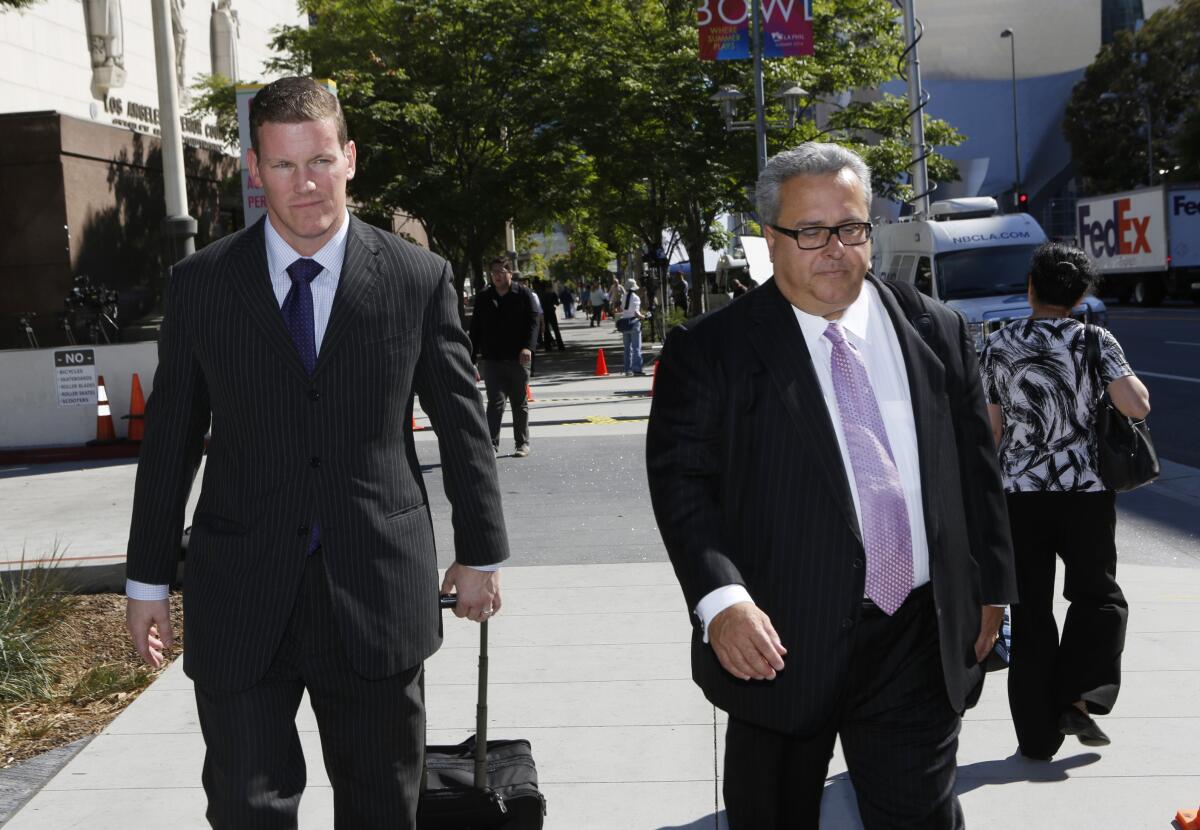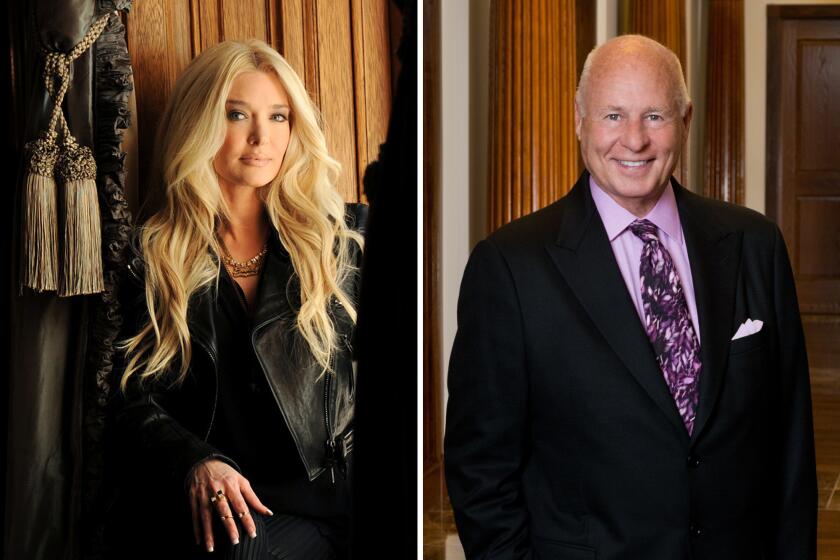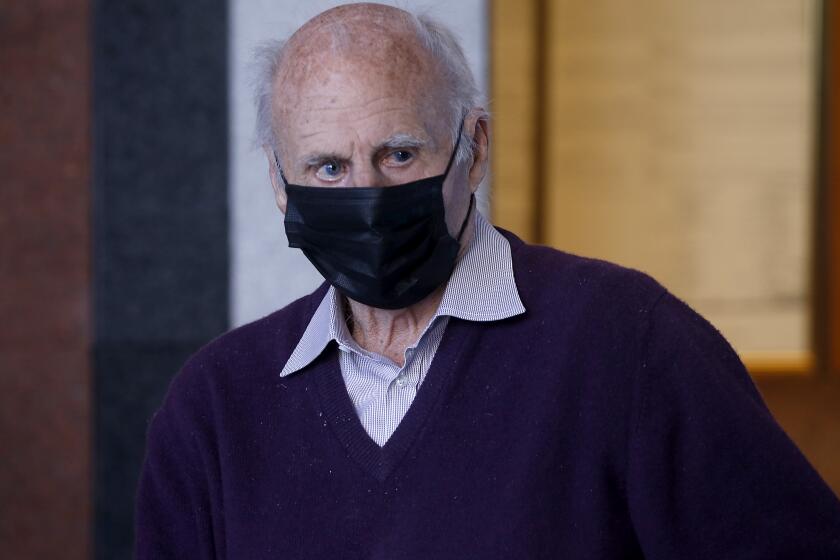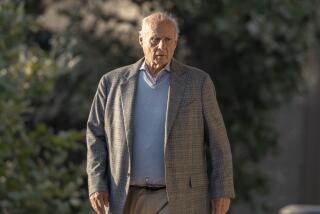Tom Girardi’s underlings warned of likely criminal charges, federal agent testifies

- Share via
Federal prosecutors have warned at least four lawyers who worked for years alongside the now-disgraced former attorney Tom Girardi at his Los Angeles law firm that they, too, could face criminal charges as part of an ongoing investigation.
The revelation came this week in the trial of Girardi, 85, who is defending against four counts of wire fraud and is accused of perpetrating a decade-long scheme to swindle his clients out of more than $15 million in settlement funds.
While being cross-examined by Girardi’s federal public defender, IRS special agent Ryan Roberson testified Monday that the government had sent letters notifying four attorneys who once worked at Girardi Keese that they were targets in the criminal fraud investigation: Christopher Aumais, Robert Finnerty, Keith Griffin and David Lira.
Although prosecutors objected to the release of the men’s names, U.S. District Judge Josephine L. Staton ruled that questions asked earlier by a prosecutor had opened the door to Girardi’s defense team pressing for details.
Former legal titan Tom Girardi is on trial, accused of four counts of wire fraud for allegedly looting $15 million from clients over a decade.
The IRS agent did not disclose when the four men received their so-called “target letters,” and representatives of the IRS and the U.S. attorney’s office in L.A. declined comment. Aumais, Finnerty and Lira did not respond to emails; defense attorneys for Griffin and Lira declined to comment.
The testimony marked the first public confirmation that prosecutors in L.A. have an active investigation of additional lawyers at Girardi’s once legendary, now ignominious Wilshire Boulevard law firm. Further, in designating the men as targets, prosecutors have determined there is substantial evidence that each is involved in committing a crime, according to Department of Justice policy.
Legal experts said the issuance of target letters signifies the breadth of the criminal inquiry into Girardi Keese and elevates the likelihood of another wave of charges against those allegedly involved.
“A target letter is a big deal. The prosecutor is telling a person or their lawyer that he thinks the individual committed a crime, he thinks he can prove they committed a crime and is considering charging them with a crime,” said Julian André, a former federal prosecutor who handled fraud cases in the U.S. attorney’s office, including that of ex-attorney Michael Avenatti, and is now a partner at McDermott, Will & Emery.
Tom Girardi is facing the collapse of everything he holds dear: his law firm, marriage to Erika Girardi, and reputation as a champion for the downtrodden.
But, André cautioned, “It doesn’t necessarily mean there will in fact be charges or that charges are imminent.”
Neama Rahmani, a former federal prosecutor in San Diego who is now a civil attorney in L.A., said that with a high-profile defendant like Girardi — who had more power and wealth than the lawyers under him — prosecutors may have wanted to go after him first to send a message to the public.
“Generally, you want to go to trial against the main target of your investigation and not try everyone together because you end up having multiple defense lawyers, all cross-examining each witness. It can slow down your case, cause a lot of confusion and cause finger pointing,” Rahmani said. “You want to keep it clean in a case like this. I think if and when Girardi is convicted, I wouldn’t be surprised if other individuals are indicted or they work out plea deals.”
Lira — Girardi’s son-in-law — has been indicted separately in Chicago. He, Girardi and the law firm’s former chief financial officer, Chris Kamon, are accused of misappropriating $3 million from settlements belonging to widows and orphans of a Boeing 737-Max crash in Indonesia.
Although Girardi is the sole defendant now on trial, the names of these other lawyers — Aumais, Lira, Finnerty and Griffin — have come up repeatedly in testimony and other evidence in recent days.
Prosecutors, for example, pointed to an April 2019 email in which Finnerty highlighted the extent of the “disturbing” issues inside Girardi Keese and the pervasive delay of payments to clients.
“Your irrational outbursts and refusal to deal with client payments cannot continue,” Finnerty wrote. “You have created an intolerable working situation wherein we are confronted each day with requests for payment by clients, referring attorneys and vendors. There is much more to discuss and your running away from your obligations does not help.”
Finnerty ultimately left Girardi Keese, joined a new law firm, and represented Joseph Ruigomez in an effort to sue Girardi and collect on millions of dollars of settlement money.
The Ruigomez family turned around and sued Finnerty and his new firm, Abir Cohen Treyzon and Salo, in 2022 and accused them of failing to disclose conflicts of interest, among other allegations.

Girardi’s defense has sought to shift the blame away from their client, who suffers from dementia, and onto others at the firm. A team of deputy federal public defenders have pointed to indicators that others, like the CFO, held power over money and that lawyers knew of Girardi’s long-running mental decline and exploited it.
Jurors were shown an email in which Girardi instructed his accountant to remove Lira’s name from a bank account in the summer of 2020 — emphasizing that not just Girardi held signature authority over firm money.
Girardi’s defense has also emphasized how other lawyers under him handled day-to-day duties on thousands of cases. Most clients rarely, if ever, interfaced with Girardi.
Erika Saldana, whose toddler was severely injured in a car crash caused by a drunk driver in 2015, testified that she worked closely with Aumais to sue the manufacturer of the car seat and the driver who caused the collision.
In a victory for prosecutors, a federal judge in Los Angeles finds disgraced former lawyer Tom Girardi, 84, competent to stand trial.
Girardi got involved at the end, when in 2019 the firm secured a $17.5-million settlement, she said.
Although Girardi’s firm was to transmit her settlement within 60 days, she waited and waited for her full amount. In February 2020, Aumais told her via email that it was in Girardi’s hands because he was owner of the firm.
Saldana emailed Aumais again two months later, explaining that she had “lost so many opportunities to buy a house,” because they hadn’t received the full amount of money.
Aumais replied: “As head of the firm Tom has sole control of the settlement funds. He is the one who distributes and signs off on checks.”
Saldana said that she and her husband never got the outstanding $1 million they were owed.
Former Girardi Keese attorney Alexa Galloway testified that she repeatedly asked her supervising attorney, Griffin, about unpaid money owed to Judy Selberg, whose husband died in a 2018 boating accident.
Galloway testified that she went to the firm’s partners every day asking if the settlement had been paid. Griffin informed her that he’d talk to Girardi. Galloway also emailed Aumais in October 2020, telling him that she’d sent Girardi weekly memos about the case. Aumais told her to keep sending emails, adding, “Maybe print the memo and talk to him today?”
Galloway said her efforts to alert partners and senior lawyers at the firm — like Aumais, Griffin and Girardi’s brother, Jack Girardi — left her frustrated and disappointed.
“As partners ... I trusted all of them,” Galloway testified. “I also trusted Tom.”
More to Read
Sign up for Essential California
The most important California stories and recommendations in your inbox every morning.
You may occasionally receive promotional content from the Los Angeles Times.















